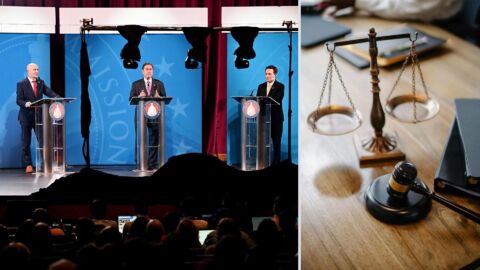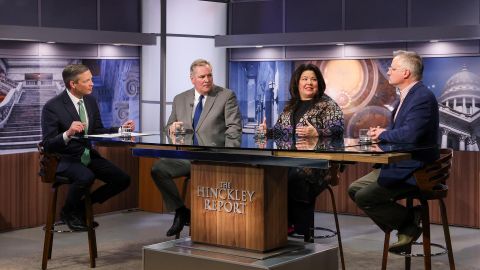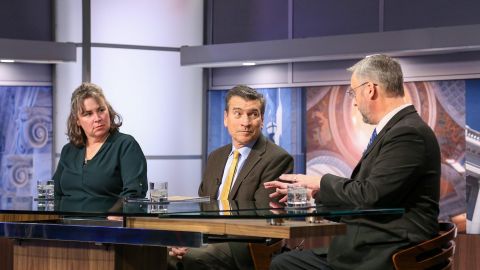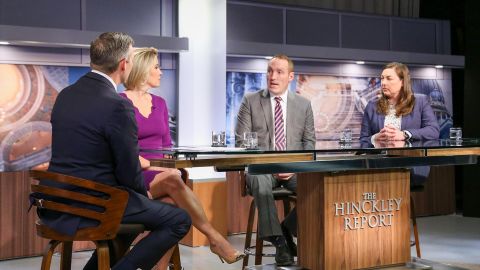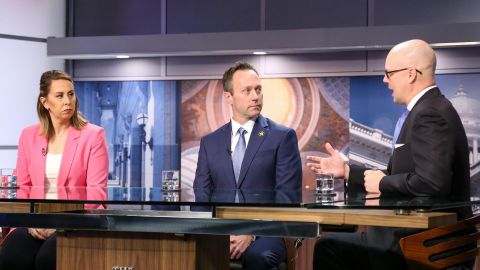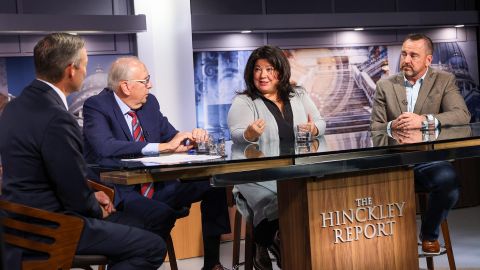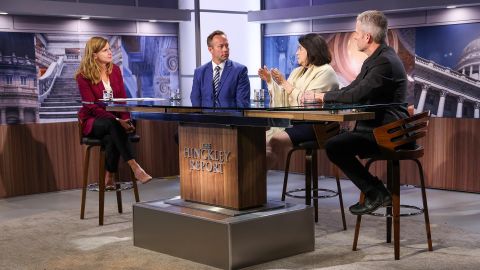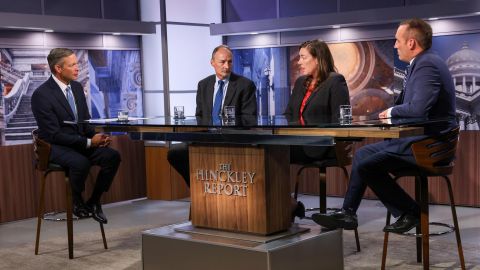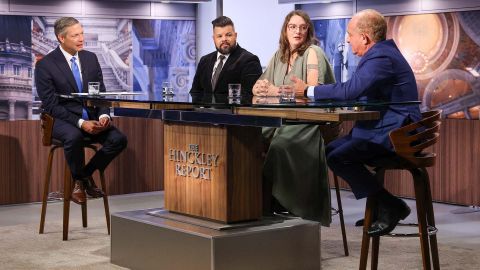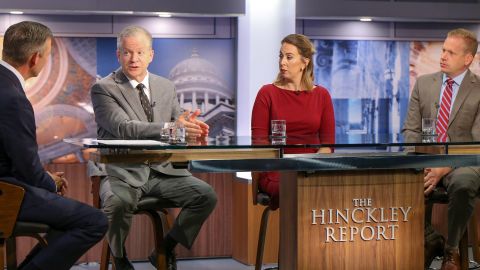announcer: Funding for "The Hinckley Report" is made possible in part by the Cleone Peterson Eccles Endowment Fund.
♪♪♪ ♪♪♪ Jason Perry: Good evening, and welcome to "The Hinckley Report."
I'm Jason Perry, Director of the Hinckley Institute of Politics.
Covering the week we have Derek Brown, partner at Lincoln Hill Partners; Holly Richardson, editor of Utah Policy; and Damon Cann, Political Science Professor at Utah State University and former mayor of North Logan.
So glad to have you with us this evening.
There are a lot of interesting developments in Washington D.C. all the way back home that have election consequences and otherwise, including other parts of the world.
So, I wanna start first with the new speaker of the house, Derek.
Talk about this for a minute.
We're starting to get to know Mike Johnson from Louisiana.
What do we know?
And but also get to the idea of why are we so interested in who the speaker of the house is?
Derek Brown: Well, one of the reasons I think that we're interested is that we've never actually seen this process play out in front of the public.
I mean, in 2002, Nancy Pelosi was elected speaker, and every two years the Democrats continued to elect her over and over and over up for 20 years, and frankly, the Republicans as well with Mitch McConnell.
I mean, clearly there was stuff going on behind the scenes that kept them in power, but we didn't really see that as a public, right?
We didn't get a chance to peek into the messiness, and John Curtis made the comment the other day that he said this is a messy process.
So, we've actually got to see this really messy process unfold in the public eye.
We're not used to it, but part of me feels like, you know what?
It's the process, it's the way things work.
And so, I think that's why, you know, getting a bird's eye view into this messy process that we don't always see is why I think so many people are interested in this.
Jason Perry: Yeah, so Holly, the sausage making on this one was very visible, and the Democrats were definitely taking advantage of this.
Talk about in terms of the Republican Party itself as they're kind of going through this process.
What the results are, what do we know about the party because of what happened?
Four rounds to get to a speaker.
Holly Richardson: It's not just the rounds, right?
I mean, it took 15 for Speaker McCarthy to become speaker earlier this year, but it's the number of days without a speaker, 22 days, right?
And people who would come out as the nominee and then get torpedoed on the floor in the house vote.
And I think one of the things that will happen is you will see the Democrats use some of what occurred during the speakerless time as campaign ads.
I mean, I think they write themselves in many ways, and I think it can be very damaging, right?
I mean, we know over and over the polls are showing there's just plummeting confidence in Congress.
The majority of Americans think the US is heading in the wrong direction.
Nobody really likes the front runners for either party, right?
And so, and so really, I mean, I think it can be--it could be very damaging.
So, we'll see what Speaker Johnson can come up with, but I think it could have long-lasting impacts.
Jason Perry: Aside from just the pure politics of it, Damon, can we put on your political science professor hat for just a moment?
Talk about the importance of the particular position and what's happening right now in the world that needs us to have a speaker.
Damon Cann: Yeah, well, the House of Representatives cannot conduct any business until they have named a speaker.
The only thing they could do in this interim three week period is vote on who the new speaker would be, so big issues addressing Ukraine, addressing Israel, all these massive global issues have had to be on pause because the House of Representatives can't deal with it.
And there's tremendous power vested in the speaker of the House of Representatives in terms of influencing composition of committees, having influence on scheduling, timing of bills, this is a hugely important position, even though many Americans can't always name who the speaker of the House is.
If there's something good that comes of this, I think it's that more people have an awareness of how important it actually is that we have a speaker.
Jason Perry: Absolutely right.
It's interesting, Derek, all three of our members of congress voted for him.
Senator Romney didn't seem to be that thrilled with the pick though.
Derek Brown: No, he wasn't.
And my guess is this is him, you know, kind of throwing shade on the new, you know, this new speaker who frankly up until, you know, up until this week, most of us have never heard of him before.
And so, I think that creates kind of an interesting dynamic.
Holly Richardson: I don't know that he's throwing shade as much as he's saying, you know, look, he doesn't have any experience.
That's the quote, right?
Is, "I guess you don't need any experience to be the speaker."
Derek Brown: But that is kind of shade, and I was-- it reminded me-- Holly Richardson: But it's also true.
Derek Brown: But it reminded me of when I worked on the Hill, Bill Frist was the majority leader for the Senate, and he really didn't have much of experience either.
I mean, so I think it's always interesting to see who the caucus looks at behind the scenes and says, you know, this is someone we can get behind.
This is someone we can trust.
I mean, this seems like an interesting pick, but you've got to have someone that gets enough of the votes, and that's the name of the game.
Holly Richardson: I think part of the appeal for him was that because nobody knew him, he's not controversial in that way, right?
A lot of stuff has come out since then about previous statements and things that he said, but he really has kind of kept his head down.
He hasn't made a lot of enemies.
And I think at this point that's probably what the House was looking for, and you're right, not only do we have Ukraine, but we also have the spending in general, right?
So, the continuing resolution runs out on November 17.
Jason Perry: Yeah, so let's get to a couple of those points.
And, Damon, you brought it up initially, so I wanna talk about some of the efforts from the House immediately.
And one of them is 17 must-pass, you brought this up a bit, 17 must-pass spending bills, and a couple of them are dealing directly with Israel and Ukraine.
Damon Cann: Yes, and I don't think there could be a tougher test for a brand new speaker of the house who doesn't have a lot of background and experience than what's ahead in the next couple of weeks here.
And the reason why, to, you know, to increase the stakes, is that these are the very same issues that got our previous speaker chucked out by being willing to compromise with Democrats, use Democratic votes to pass a continuing resolution to fund the government for a couple of months, kick the can down the road a little ways.
And now we have a fresh leadership team that's going to be tested in a serious way right off the bat to see if they can even keep the government open.
Jason Perry: And that's November 17, Derek.
Derek Brown: It is, and you know what's interesting is I talked to a high level staffer on the Hill who was very involved in the previous McCarthy issue, and I said, "What is it that--how did this happen?"
And he made the comment, he said, "I think he promised too much to too many people."
And that's a lesson in, you know, leadership or the lack of leadership.
And so, the question is will the new speaker make the same mistake by promising too much to too little?
And that's--it also makes me wonder what's been promised, you know, to get to this point.
But to Damon's point, this is now the same test that the previous speaker had.
And so, we'll see how he deals with this.
Jason Perry: Let's talk about some polling that we did on these two issues, because the Hinckley Institute of Politics with the Deseret News did some recent polling about where Utahns are on these two wars and what we should be doing as a country.
And the first question, Holly, if we can talk about this for a moment, how closely you're following the war in Ukraine, 61% of Utahns say that they are falling somewhat or very closely.
And what was interesting is the question is do you think we're doing enough?
And 55% of Utahns said yes, but the results about what they think we should be doing more and to continue doing are very interesting.
Holly Richardson: Yeah, I mean, I think when you did your poll, you gave them multiple options, right?
So they could pick one or more, but 71% think we should be doing humanitarian aid, 45% think the military, US military should be involved, but not with troops, 20% think we should use troops, 15% think we should do nothing.
Jason Perry: So, interesting numbers right here, Damon, because Utahns really do have this worldwide perspective, and I wanna give you one more on the Israel-Hamas War, because we asked that to see how these numbers are a little bit different here, 75% of Utahns are watching that one very closely, so that number goes up from that 61%.
This one seems to be something Utahns are paying a lot of attention to.
Damon Cann: Yes, Israel, Hamas, I think part of that is just recency.
It's new, Ukraine has been raging for some time.
And also conflict in the Middle East is a--while the current eruption of violence there is ver--is more recent, the conflict is very long-standing, and it's something Utahns have been paying attention to.
And yet a lot of the discussions about what intervention looks like, the whole thing is so Utah.
We care a great deal about people.
We want to be engaged in the world.
The greatest amount of support for humanitarian aid, taking care of people, the least amount of support for US actual engagement with troops on the ground in both conflicts.
Jason Perry: Go ahead, Derek.
Derek Brown: Well, no, and I think what's gonna be interesting now is we have the president who is--who has called for a very large spending package, but he's pairing all of these different things together.
And this is a long-standing trick that we've seen.
Well, we've seen it here in Utah, we've seen it across the nation, and we've seen it as well at the national level where they'll take four or five different things on which nobody agrees, but pair them all together, and then dare them to vote against the whole package, knowing that then you could be criticized.
I mean, so President Biden has included funding at the border, right, as well as funding for Ukraine and Israel and Taiwan as well.
I mean, so it's--in some ways it's a long-standing sort of trick, but it's also a good strategy.
So, we'll see if it works, but funding doesn't start in the White House.
Obviously, it starts in the House.
Jason Perry: But we also see to this great point, Holly, as you've been following it as well, that's why Senator Mike Lee is out right now saying separate the funding requests.
Holly Richardson: Well, and even the new speaker said in an interview yesterday that he wants to separate, he wants to see a bifurcation of that and vote on two separate packages.
There is falling support for Ukraine.
And I think for me personally, I think that's sad, because I think they are now past 600 days of war, and, you know, people get war fatigue, and Israel is still new, it just happened this month, and I think Americans seem to have more affinity for Israel overall than they do for Eastern Europe, right?
And yet I personally think it's very similar to the same type of battle that's being fought.
Jason Perry: Let's switch gears for just a moment, and this is purely into the very entertaining part of politics.
A big book came out this week.
We talked about it on the show a couple of times, people thought that maybe this book would-- gave a little signal to what Senator Romney was going to do, and I know you just finished it, right, Holly?
So, this is "Romney: A Reckoning," McKay Coppins from the Atlantic has just released this book.
You just got through it right away.
We're--all the rest of us are making our way through it.
Some interesting points from that book.
Holly Richardson: Well, look, I think some of the interesting points have already made it out into news stories and things, but one of the things that really struck me is kind of the introspection that Senator Romney had to do with, you know, what happened with January 6, for example, what happened not only with his impeachment vote, but why--how he got there.
And he, I mean, he knew this was the end of his political career.
He knew that, but he also felt so strongly, right?
And I think the--I think having McKay Coppins be a member of the Church of Jesus Christ of Latter Day Saints as well as Romney really gave some flavor to why he felt so strongly for him.
I know that there have been people who've questioned, why did he come out and he's poking people in the eye, right?
There is some of that.
Well, you know, I think Mike Lee just doesn't, you know, feel like he maybe he's afraid of me or in my shadow, right?
I mean, some things like that.
But there also was this really great overview that I really enjoyed and appreciated, and I really liked the idea where he's telling his--himself, his wife, his kids, "What's the legacy that I want to leave," right?
"And it's not to stay in the Senate forever, it's not to change my vote so that I can make sure I get re-elected."
And I think we know that we see a lot of politicians who do do that.
Jason Perry: That's true.
Damon, what's interesting now, you're such a great researcher and writer also, let's talk about what went into this book.
There were, I understand, 45 separate meetings where Senator Romney, you know, gives him his journals, his text messages, like, the full look at what's happened in his time as a senator.
Damon Cann: Yeah, yeah, you know, a book like this is really difficult to write.
Senator Romney clearly has a lot of trust and confidence in McKay Coppins being willing to give that extensive and unlimited access.
But Romney is someone who I think as a politician and as a person has really wanted to leave his mark on the world.
And I think that's part of the reason why he's been willing to step up and say some things that have got a little bit of an edge, that have got a little bit of a barb to him when it comes out.
And, as a result, I think this book is probably an effort, and being as open as he's been with Coppins, is an effort to really leave kind of that last record of what he's been about, what his goals are, what's motivated him, and why he's done what he's done in public service.
Jason Perry: Derek, it's so interesting, since it came out all around the state people are reading it, and sometimes there are not names there, so everyone's, like, talking around, is that me that he's talking about?
Was I the one they're referring to?
But what's interesting about this too is some people thought that knew this book was coming out that this is maybe the first sign that Senator Romney is not gonna run again, was a book like this was gonna come out.
Derek Brown: Exactly, well, and I had kind of a unique perspective on this because, I mean, the reality is sometimes I served as the chairman of the Utah Republican Party, and sometimes I felt like I was-- like there were about five political parties in the state, and I was the chair of four of them, and Senator Romney sort of represented one side of that party.
And in fact, I was at--I was conducting a statewide convention when he got up and he was booed by the delegates.
And I think for a lot of these reasons we've talked about that we're now finding out in the book, I mean, he was willing to sort of go against the grain with his own party.
And while we could, you know, agree or disagree over whether it was the right thing to do, I mean, he did it over and over, and it didn't faze him, the fact that, you know, the--this convention center with thousands of people booed him.
I actually got up, and I was the one who calmed the crowd and said, "Look, this is one of ours, and please show some respect."
But the fact that he was willing to do that again and again, I mean, whether you like him or not, you have to respect that.
Jason Perry: Go ahead, Holly, last comment on that.
Holly Richardson: Well, I was at that convention as well, right?
And I think one of the things that came out in the book was it was not just booing, it was cries of traitor and calling for not only his removal from the Republican Party, but actually for his execution, right?
And those types of threats led him to pay $5,000 a day for personal security, right?
And it's very concerning when we let disagreements with people, even within our own political party, but when we let disagreements rise to the level of threats of violence.
There's actually brand new polling out this week that I saw that said 30% of Republicans now believe that violence is appropriate sometimes to save the country, and that's scary to me, that's concerning.
Damon Cann: You know, one thing that I think ties this Romney discussion with the speaker of the House thing is something symptomatic of we're seeing broadly in our politics.
We've been polarized for a long time now between Republicans and Democrats.
What often follows that polarization is factionalization, because as the parties get further apart, it also allows people to diversify within a party and have a hard time agreeing with each other.
And so, now not only are we facing stretches in the fabric of our country of polarization between parties, but actually growing factionalization within parties, and that poses an additional challenge to the well-being of our Republic.
Derek Brown: Can I add, when I was the state party chair of the Republican Party, I met a lot of other party chairs from around the country, and all of them are dealing with this issue.
This is not a Utah specific thing.
And not only that, if you look closely, all parties are dealing with this.
The Democrats are dealing with this as well.
And so, this is not just sort of a Utah specific thing as it pertains to Senator Romney, this is nationwide.
Every state has Republican and Democrat parties with these factions within it, and we are becoming increasingly polarized, as you mentioned, Damon, at every state, at every level.
Jason Perry: One of the factors at the heart of these discussions nationwide is former President Donald Trump.
And let's talk about that for a moment, Damon, because we've done some polling to see how he is faring among voters in the state of Utah, and this has been sort of a steady line for him in Utah.
So, this is if the presidential primary were held today, who would you vote for?
This is news just immediately from this last week.
Donald Trump is at 24% overall.
That's 30% among Republicans, but what's interesting is DeSantis has leveled off at 11%, but the rise has gone to Nikki Haley, who is at 12%.
Damon Cann: Yeah, there's a number of interesting things to unpack here.
Of course, Donald Trump has always struggled to gain traction in Utah in ways that he has elsewhere.
He wins Utah in both 2016 and 2020, but Utah giving him much smaller share of the vote than you'd expect in a red state.
And then the interesting thing, the thing I find interesting about Ron DeSantis is that several months ago a wide range of Republican leaders around the state of Utah signed on to something of of a compact agreeing that they saw DeSantis as the real leader of the national Republican Party, trying to steer and influence Utahns votes in that direction.
That effort seems to have effectively stalled out as we see Nikki Haley gaining strength, a little bit of popularity here, I think on the heels of some pretty good debate performances in the Republican primary debates.
And it'll be really interesting to watch whether that kind of a trend continues.
Jason Perry: Derek, two of the more interesting numbers from that poll were these, 15% of Utahns said someone else, who that might be, and 28% said they don't know.
Derek Brown: Well, it's interesting that Trump has continued to maintain his lead.
I've often wondered, I mean, during these sort of pre-primary processes, you see people come and go, and I've been wondering if Nikki Haley would at some point kind of have this upward trajectory.
I was at an event the day after the January 6 incidents, and it was an event with a lot of Republican leaders around the country.
Nikki Haley spoke, and I was fascinated to see if she was gonna say anything about it or if she was gonna just sort of get into the background and not get into it.
And she took it head on and said what happened was inappropriate.
She called the president out.
And the party kind of went after her, but to her credit, she sort of kept at it, but it showed some courage.
And so, I've often wondered, okay, at what point does she start kind of an acceleration?
You know, because we have a president who will have, I think, four criminal trials next year, one right before Super Tuesday, one right after, as well as a civil fraud trial.
So, I mean, Nikki Haley could be the one to watch.
Jason Perry: What I'm watching a little bit too is interesting, as you see sort of the sides so far apart on this, Holly, is there--is this a moment where a third party, a no label sort of party may have a chance, or still no?
Holly Richardson: You know, probably still no, but, you know, it's I think this fractionalization is what does allow third parties to actually coalesce and come up with something.
So, speaking of the Romney book, that was in there several times, including floating the idea of a Romney-Oprah ticket.
Derek Brown: Which actually could have gone somewhere.
Holly Richardson: In 2020, right, in 2020.
And, you know, and it's just the idea of we've got to bring people, you know, can you have a coalition of Democrat and Republican who run for president and vice president and their, you know, caretaker presidency for four years?
I don't know.
I think it's probably still premature.
We don't have a lot of support for third party, even though people say somebody other, when it comes down to actually pushing a button to vote, then they pick somebody, right?
But Nikki Haley is fascinating.
Jason Perry: One more election to talk about, Damon.
We have our second congressional district coming up, November 21.
All right, so it's a different date, we need to keep that in mind for those people who live in that second congressional district.
Celeste Maloy and Kathleen Riebe debate this week they've just had, talk about that race as it's kind of unfolding.
Damon Cann: Yeah, both really interesting candidates with some interesting backstories.
It's really wonderful, I think, to see two women running against each other, something that's been unique in Utah's congressional election history, and both, you know, watching the debate last night, it was calm, it was substantive, and it was nice to see a debate look like that after the kinds of debates that we've often seen in our national politics over the last several years, to see that we can have two people with differing opinions sit down in the same room and have a civil, decent conversation about their vision for the future of our state and for the future of our country.
So I, for one, would love to see more of this kind of campaign.
Jason Perry: You were there at the debate.
Derek Brown: I was there, I serve on the debate commission, and so we've had some debates where we've left going, oh, that didn't quite go the way that we had hoped.
Last night it was fantastic to have, you know, for the first time ever two women who are congressional candidates debating.
And in fact, I was talking to the moderator, Mary Weaver Bennett, afterwards, and she made the comment, she said, "Everyone respected the time clock, they were respectful."
But, and, you know, you like to have fireworks, I guess, you know, from an entertainment standpoint, but the reality is I love seeing two candidates who were really willing to dig into the substance of stuff.
I mean, they talked about social security, they talked about Israel and Hamas, they talked about federal lands.
We had a Democrat say, you know, and I haven't heard this for a while, but basically say, "Look, the deficit is a major problem, and I would be willing to focus on this."
And so, I mean, I love kind of that approach, and I think overall it was quite a success and an interesting experience.
Jason Perry: I wanna talk about what's coming up for this legislative session for just a moment, because some big items are coming.
And Damon, can we tap into your previous role as a mayor here too, former mayor of North Logan?
So, housing seems to be a primary consideration throughout the state of Utah, every city and apparently the number one priority of our governor.
Damon Cann: Yes, Governor Cox has been talking a lot about this issue, a lot of focus on it from legislators who are very interested in it as well.
And look, anybody who's been out there shopping for a house in the last couple of years feels and recognizes that this is a significant issue.
One of the things that concerns me, this is a complex, multifaceted issue, and as a former mayor, I can tell you cities have a part in this conversation, and the problem won't get solved without them.
But I'm concerned that the tenor of the discussion is swinging so much in expectation that cities should solve the problem, and there's lots of action that's needed elsewhere, and cities aren't the sole cause of the problem.
There's over 150,000 lots that are legal, permitted, subdivided, that haven't had building permits on them that are just sitting and waiting for reasons other than cities who have, according to the narrative, been unwilling to permit.
And in the last three years, we've had more--excuse me, in 2019 to 2021 more housing permits granted than any other three year period in Utah's history, and over half of them are not single family homes, the kinds of of more dense kinds of structures.
You can probably find some cities in some parts of the state of Utah that might not be doing everything that they can, but in general, cities are working really hard to do their part for the things they can control to solve these issues.
Jason Perry: Derek, in our last minute just to finish this conversation, because people like the governor kind of saying, "Cities, let's talk about this point.
You get it together, or we're gonna step in."
Derek Brown: Exactly, well, and the reality is also cities aren't always doing what they can.
I mean, there are certain cities, I mean, to call one out, Moab, who complains about the lack of affordable housing in Moab, and there really is, I mean, it is really hard, if not impossible, to get affordable housing in Moab, but try building affordable housing.
They won't grant permits to do it.
And so, that's the tension.
And so, that's why we've seen, as Damon mentioned, all those lots that are going, you know, unused, states like California have basically started taking the responsibility and authority away from cities and pulling it to the state level, and so we may see that at some point here in Utah if cities don't continue to work on this.
Jason Perry: In our last 20 seconds, Holly, are we gonna see some legislation?
Holly Richardson: Maybe, yeah, I mean, I think that's likely on housing specifically.
We know that it's a huge issue, right?
Even a starter home is a half a million dollars now.
Jason Perry: And this is gonna have to be our last comment on this.
I know we're gonna be talking about this more.
I know our legislature will, and so will our cities.
Thank you for your comments tonight, and thank you for watching "The Hinckley Report."
This show is also available as a podcast on PBSUtah.org/HinckleyReport or wherever you get your podcasts.
Thank you for being with us.
We'll see you next week.
♪♪♪





